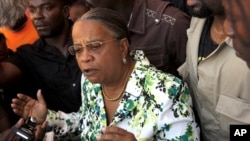Election officials in Haiti say former First Lady Mirlande Manigat and ruling party candidate Jude Celestin have advanced to the second round of the country's presidential poll.
Third-place candidate Michel Martelly trailed by less than one percent of the vote.
Haiti's Provisional Electoral Council announced the runoff between the two top vote winners late Tuesday because no candidate gained the 50 percent required to win the first round vote on November 28.
Election day problems
The election, held on schedule despite a cholera outbreak, was marred by violence and accusations of cheating. Many voters were unable to find the correct polling station despite repeated attempts.
Several presidential candidates have already challenged the vote. The runoff will be held January 16.
Protests
Merchants and residents in the capital, Port-au-Prince, had prepared for possible riots after the release of the vote tally. On Sunday, protestors clashed with police, accusing outgoing President Rene Preval's government of trying to manipulate the vote in Celestin's favor.
International observers have said the elections should be considered valid, despite irregularities that generated the protests and fraud allegations. The electoral council declared the balloting a success.
Earthquake, cholera
An earthquake in January killed more than 200,000 people in Haiti and left 1 million others homeless. The ongoing cholera outbreak, first reported in October, has led to more than 2,000 deaths.
|
CHOLERA PREVENTION & SYMPTOMS |
|
Watch Out For:
|
U.S. health officials have said the outbreak is similar to strains commonly found in South Asia.
The finding has led some to focus on a U.N. base above a tributary to the Artibonite River in central Haiti. U.N. peacekeepers from Nepal, a South Asian country where cholera is endemic, had recently arrived at the base.
But the U.N. has said there is still no conclusive proof on the source of Haiti's cholera epidemic despite claims it started in the Nepalese camp. U.N. spokesman Martin Nesirky has said water supplies from the camp have tested negative for cholera.
The bacterial infection is spread by ingesting contaminated food or water. The disease is treatable but can kill within hours without treatment.




